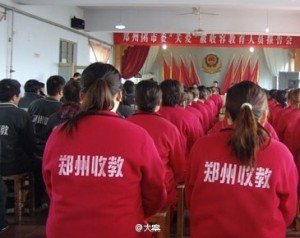Translation – Beijing News Interviews Tian Wenchang on Custody & Education
With the hoopla surrounding actor Huang Haibo’s six month sentence under China’s Custody & Education (“C&E”) system – an administrative punishment outside of the court system – on June 9, 2014, Beijing News ran an article examining that system. Included with the article was a telling diagram that highlighted the lack of a legal basis for C&E. The article effectively called for the repeal of C&E.
For an explanation of C&E and the current debate, see China Law & Policy’s previous post here.
That article is no longer available on the Beijing News website. However, it can still be found here. Additionally, below, China Law & Policy translates the portion of the article that was an interview with Tian Wenchang (pronounced Tea-en When-chang), one of China’s most famous attorneys and the current director of the Criminal Law Committee of the All-China Lawyers’ Association. In the short interview, Tian persuasively argues for C&E’s abolishment.
*****************************************************************************************************************************
Beijing News [BJN]: As one of the people pushing [for reform], why do you want think to do this?
Tian Wenchang [TWC] (Director of the Criminal Law Committee of the All-China Lawyers’ Association): The fact is that after Reeducation through Labor (“RTL”) was abolished, people forgot about Custody & Education (C&E). But because a case relating to C&E recently emerged, society is once again examining C&E, questioning whether it is legitimate and whether it should still exist.
BJN: What do you consider to be the biggest problem with C&E?
TWC: The biggest problem is with C&E is the same as with RTL: administrative agencies can deprive individuals their liberty without due process, so lots of problems appear in implementing it.
BJN: What kinds of problems?
TWC: For example, for sex workers and their clients, after undergoing an administrative punishment [under the Public Security Administrative Punishment law], public security bureaus are able to decide on their own whether the individual should also receive a C&E sentence. There are no specific standards to guide this decision. For example, six months to two years of custody, how is this term determined; it’s very possible that there are variations in the implementation. Without due process and public transparency, it’s easy for there to be a hidden agenda.
BJN: Six months to two years, is that too heavy a punishment for prostitution and solicitation?
TWC: Under the Public Security Administrative Punishment Law, [the police] are able to keep someone in custody for 15 days for a prostitution-related offense. But under C&E, the maximum sentence may be up to two years. This is often more severe than the punishment under the criminal law. Whether this [disparity] is fair or not is pending discussion.
Repealing C&E Will Likely Take A Long Time
BJN: Based on your observation, do local public security bureaus often use C&E as a form of punishment?
TWC: My understanding is that in the overwhelming majority of provinces in the country, C&E is not used very often. But this does not mean that the public security bureaus do not have the right [to use C&E]. So long as they have this right, there will be problems.
BJN: What is the relationship between C&E and RTL?
TWC: Because both are systems that restrict personal liberty, in essence they are the same. It is only the people targeted and the length of the punishment that are different. Furthermore, both are systems that don’t go through the judicial process and instead the administrative agencies unilaterally make the decision. In looking at the legal principles governing C&E, the public security bureaus don’t have a problem; rather the C&E-related legal provision are not in line with the current law. As a result, they must be repealed.
BJN: How likely do you think are the proposals to abolish C&E?
TWC: It will be like RTL which took a long time to repeal; I think repealing C&E will be like that.
**********************************************************************************************************************************
Interview Portion of the Beijing News Article on C&E – Full Article Can Be Found Here
新京报:作为推动人之一,为什么想到做这个事情?
田文昌(全国律协刑事专业委员会主任):实际上在废除劳教制度后,收容教育制度正在被人们遗忘。但是最近相关案件的出现,让社会重新对它开始有所审视,这个制度到底合不合理,应不应该存在。
新京报:你认为收容教育制度最大的问题是什么?
田文昌:最大问题是它和劳教制度一样,行政机关可以直接剥夺人的人身自由,没有经过正当的司法程序,执行过程中会出现很多问题。
新京报:会有哪些问题?
田文昌:比如说,一个卖淫嫖娼人员,在经过行政处罚后,公安机关可以决定是否进行收容教育,这个决定没有特定的标准。再比如6个月到2年的收教,这个期限怎么判定,很可能出现执行偏差。没有正当的司法程序,没有向社会公开,里面容易有猫腻。
新京报:6个月到2年的收教期限,对于卖淫嫖娼处罚重吗?
田文昌:按照治安处罚法,卖淫嫖娼犯罪行政拘留15天。但是收容教育最高可到两年,这个在很多时候比刑罚还要严重,合不合理是有待商榷的。
废止收容教育或需很长时间
新京报:据你观察,各地公安机关用收容教育制度惩戒的情况多不多?
田文昌:据我了解,全国绝大多数省份用这个制度的已比较少了。但是这并不表示公安机关没有这个权力,只要有这个权力,就可能出问题。
新京报:收容教育和劳教制度有什么关联?
田文昌:本质上都属于限制人身自由的制度,是相同的,只是针对的人群和惩戒的期限不同。另外,它们都是没有经过司法程序,行政机关就可以单方决定的制度。从法理上看,收容教育制度并不是公安机关的问题,毕竟以前有这样的相关法规,但是已经和现在法律制度不协调,所以应废止。
新京报:你认为这次建议废止收容教育制度的可能性有多大?
田文昌:和劳教制度一样,推动废止需要很长的时间,我想废止收教制度也是如此。
 On Facebook
On Facebook By Email
By Email 






